Many people have dreamed of giving up the day job, moving to the countryside, starting a small business and, more or less, living the dream. You often hear of people giving up corporate jobs to open a restaurant or small food business. You also hear of people going back to a corporate job when living their dream didn’t work out the way they planned. How does one work long-term viability into a small food business plan?
Erin Bunting and Jo Facer met while studying in university in England. Erin was born and raised in Northern Ireland, while Jo grew up in London. She jokingly tells Irish Country Living that, where Erin had the surrounding fields to play in as a child, she would play on the concrete.
“There is no real reason why, but from a young age I thought I would grow up, move to the country and grow my own food.”
The Edible Flower
Fast forward a few decades and that is exactly what Jo and Erin, alongside their four-year-old twins, are doing on their smallholding in Ballinahinch, Co Down, with their food, hospitality and community-supported agriculture (CSA) business, The Edible Flower.
Jo and Erin started out in London and eventually left their corporate jobs to pursue their dreams. Erin attended Ballymaloe Cookery School to train as a chef, and Jo realised her childhood dream of growing her own food. After six years they are still growing their business, and they openly share the highs and lows.
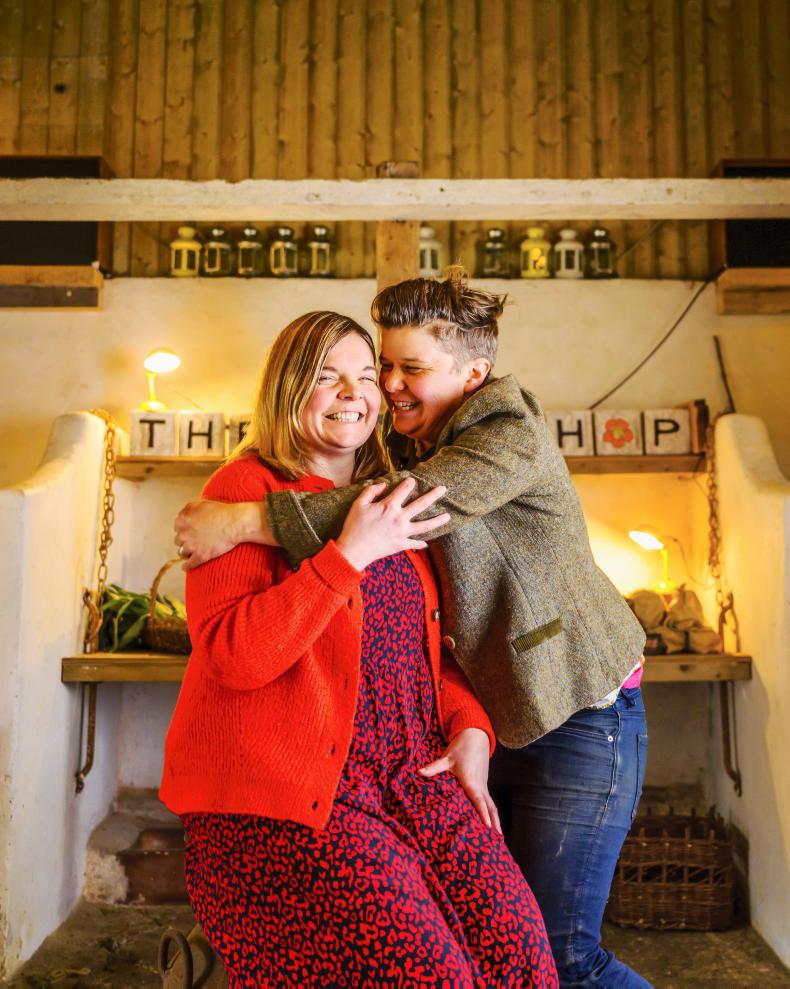
They are driven by a passion for community building, a love of sharing food with friends and a desire to leave their patch of earth a bit better than how they found it. Being financially successful isn’t their only goal, but they are also realistic about their business needing to provide – not just for them, but for their children and their locality.
Taking the plunge
After Erin attended Ballymaloe – and while the couple were still living in their London home – they started hosting supper clubs. This was a creative outlet, but it also gave them valuable insight into how their approach to food and hospitality might be received if they put all of their energy into their own business. They decided to take the plunge, selling their London home and moving to Erin’s locality in Northern Ireland.
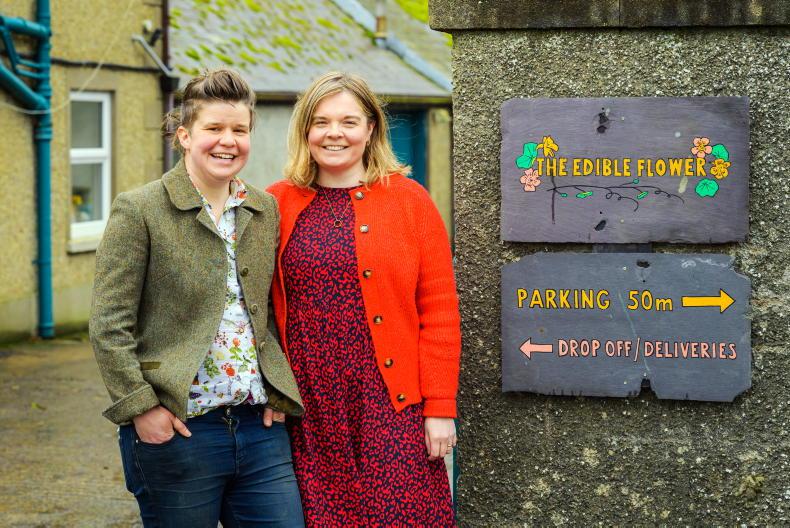
“We both had corporate jobs – with nothing to do with food,” Jo explains. “I convinced Erin to move out of the city and it seemed logical to come to Northern Ireland as Erin’s from here, her family are here and mine, at the time, were all pretty much in London.”
Erin adds: “We moved back here in 2016 – in April – and we took a bit of time, did a bit of market research and met some people. We didn’t have [the house where we now live and operate our business from] at that time, but we started doing some catering and running some supper clubs out of other venues, like the Irish food shop, Indie Fude. We bought [our smallholding] that October and started preparing the grounds for growing food immediately.”
Small steps
Year by year, Erin and Jo increased their growing area for vegetables and began restoring the outbuildings around their main house. They started hosting summer food events. In November of 2021, they invested approximately £150,000 (€167,860) on more advanced renovations on the outbuildings, building a kitchen and heated event space. Erin cooks – using as much of Jo’s homegrown produce as possible – and they have three staff members who work part-time.
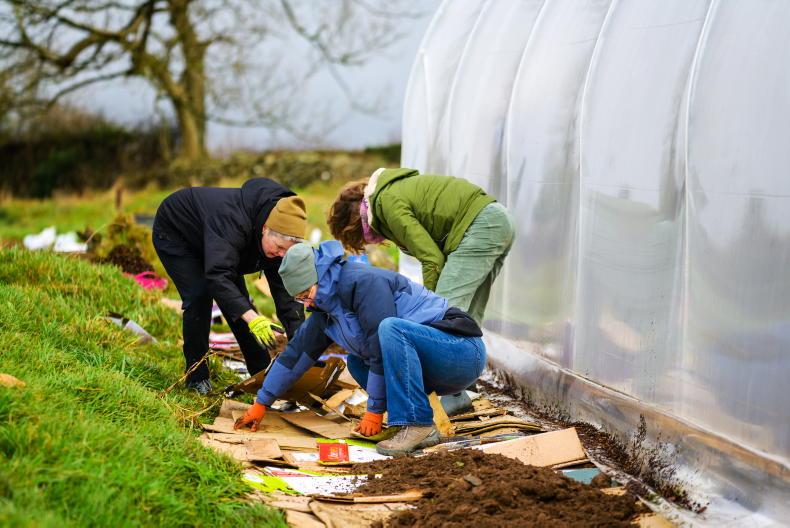
.
Besides hosting events and their regular supper clubs, they also offer food, drink and craft workshops and welcome the community into their home and farm through their CSA scheme, Farm and Feast.
Community Supported Agriculture
Also known as cropsharing, CSA schemes welcome members of a community to become shareholders (though Jo and Erin prefer to use the term “members”) in a local farm. In this way, the community supports the farm financially (regardless of how successful any given harvest might be) and take their shares of the harvest.
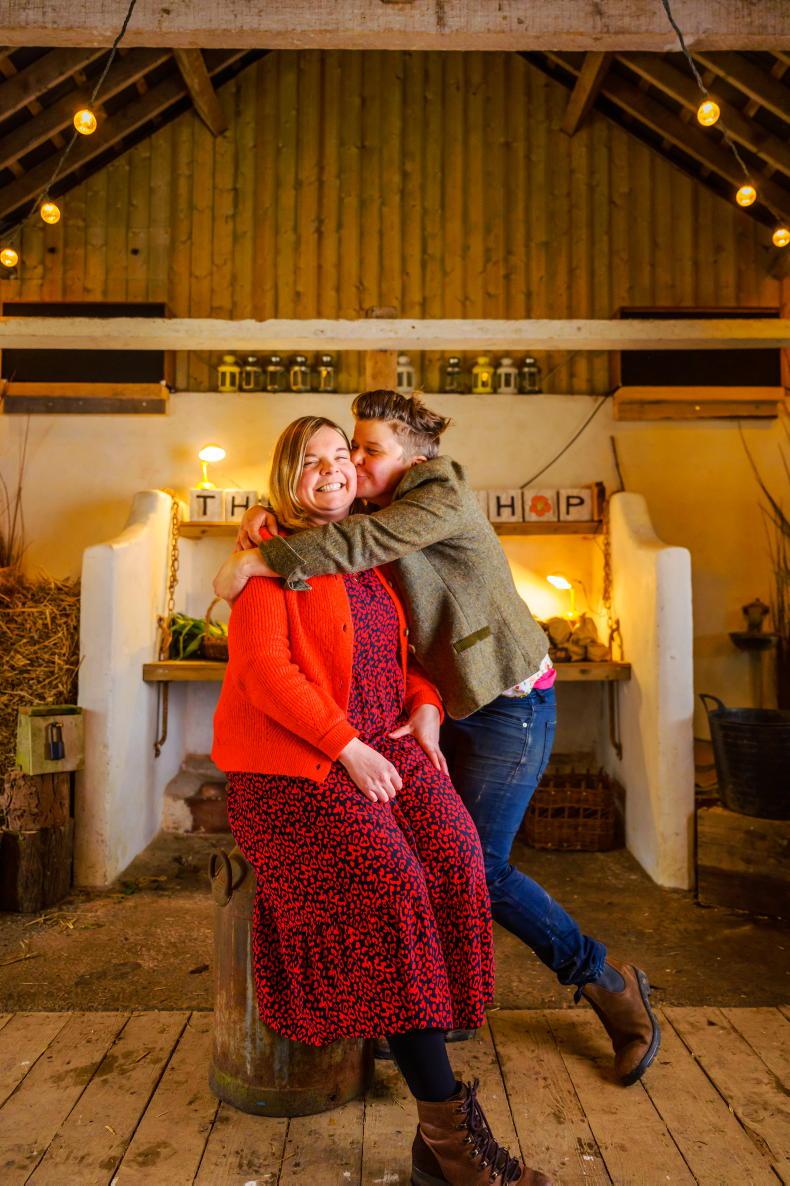
.
Farm and Feast at The Edible Flower came about as Jo and Erin were planning to cater several weddings before the COVID-19 pandemic struck.
“We were growing for all these weddings and suddenly everything was cancelled,” Jo recalls.
“We bagged and sold our salad greens through a local farm shop and a few other vendors in Belfast. Once we got going, then, we started a tiny vegetable box scheme,” Erin adds.
Once people could meet up again, the couple started their summer garden evening workshops, which were well attended. As interest in their farm grew, they started taking on community garden volunteers and in 2022 the CSA scheme really got under way. The 2023 Farm and Feast season is yet to begin, but Erin and Jo hope to have 30 members this year (double the numbers from 2022).
How it adds up
In a recent blog post on their website, Jo posted, with full transparency, how their CSA scheme is doing financially.
“The dream was that everyone in the scheme would come together, that we would help build a vibrant community of people committed to eat well, supporting local and honouring the land,” she wrote.
While their first season of CSA was successful in many ways, Jo says the finances, unfortunately, did not add up. Aside from the other areas of their business, the scheme alone brought in £11,000 (€12,312) of income while the running costs of the scheme were £20,000 (€22,386).
In this way, Jo says, it’s “not yet achieving one of its goals”, which is to be sustainable – in every way, including financial.

.
“We are continually putting prices up and doing more events, but there is this constant battle to make it add up,” she tells Irish Country Living. “We did nine nights of a solstice supper club [in December, 2022]. I did the maths – we had £18,000 (€20,148) of income. Twenty per cent goes straight to VAT, then £4,000 (€4,477) goes into ingredients, £5,000 (€5,596) goes into temporary event staff and another £5,000 (€5,596) goes to regular employees [Erin, Jo and their three other employees]. That’s the reality.”
The trade-off
While making a loss in Farm and Feast’s first year was a setback, Erin and Jo are far from ready to pack it in. In her blog post, Jo outlines the changes they will make to the system to make things more profitable in 2023. These include extending their growing season from 20 weeks to approximately 28 weeks, increasing membership and selling excess produce by creating a small farmgate shop.
While both admit the work is difficult in many ways, neither can really see themselves going back into a corporate role. It’s la (realistic) bella vita.
“We’re really lucky,” Erin says, “we’ve built up a mailing list over the years, so we have 1,500 people on it and that really helps with selling tickets [for events].
“The first ones after COVID sold out in just a few minutes. I was a bit worried maybe that popularity would die off – and it’s definitely slowed – but we know our events will always sell [by the day of the event].”
Redefining success
Jo sums up how they feel at the end of her blog post: “Let me put our £9,000 (€10,073) loss into context,” she writes. “It isn’t of course actually £9,000 missing from our bank account. “It’s 90 days of Erin’s and my time (90 x £100 = £9,000), so less than one day a week, each.
“For that one day a week of unpaid work, we’ve had access to the best vegetables just outside our house every day of the year. We’ve met an absolutely brilliant group of people who share our loves and concerns and joys. We’ve eaten lots of leftovers!
“And every day (except the moments when we’re doing boring human resources admin, or VAT returns, or COVID Risk Assessments) we get to do work that we really, really love and really, really care about. And for one day a week, that seems like an unbelievable small price to pay!” CL
Erin and Jo’s
advice for longevity
Start small
“This is a great way to minimise investments and overheads while you test your ideas and decide if this is really what you enjoy doing. We ran lots of supper clubs from other venues before we invested in our own event space, and we spent a few years growing produce for our own events before running our CSA scheme.”
Build in time for rest
“Everyone will say you need to create boundaries, have days off and proper holidays. And it is very easy to think that applies to everyone else, but not you. We are definitely guilty of this and have learned to our cost that if you don’t make time for rest then you will be tired and grumpy and find it hard to enjoy what you are doing.”
Enjoy the journey
“If you are running a small-scale, values-led food or agricultural business, you are probably not doing it to become rich quickly,” Erin says. “Instead of always focusing on long-term goals, we try to make sure that each event or project we work on brings us happiness and positively contributes to the ethos of our business. If parts of our business aren’t doing that anymore, we stop doing them.”
The Edible Flower Book
In case they haven’t been busy enough, Jo and Erin recently wrote their first book: The Edible Flower: A Modern Guide to Growing, Cooking & Eating Edible Flowers. It will be published on 9 March 2023 and is currently available for pre-order.
theedibleflower.com
Next week
We have focused on holistic opportunities for growth so far in this series, but next week we will discuss the practicalities of running a small food business and how you can use technology to your advantage.
Read more
Think snail farming is a get-rich-quick scheme? Think again
Interested in developing agri-tourism on your farm? Here’s what you need to know
Many people have dreamed of giving up the day job, moving to the countryside, starting a small business and, more or less, living the dream. You often hear of people giving up corporate jobs to open a restaurant or small food business. You also hear of people going back to a corporate job when living their dream didn’t work out the way they planned. How does one work long-term viability into a small food business plan?
Erin Bunting and Jo Facer met while studying in university in England. Erin was born and raised in Northern Ireland, while Jo grew up in London. She jokingly tells Irish Country Living that, where Erin had the surrounding fields to play in as a child, she would play on the concrete.
“There is no real reason why, but from a young age I thought I would grow up, move to the country and grow my own food.”
The Edible Flower
Fast forward a few decades and that is exactly what Jo and Erin, alongside their four-year-old twins, are doing on their smallholding in Ballinahinch, Co Down, with their food, hospitality and community-supported agriculture (CSA) business, The Edible Flower.
Jo and Erin started out in London and eventually left their corporate jobs to pursue their dreams. Erin attended Ballymaloe Cookery School to train as a chef, and Jo realised her childhood dream of growing her own food. After six years they are still growing their business, and they openly share the highs and lows.

They are driven by a passion for community building, a love of sharing food with friends and a desire to leave their patch of earth a bit better than how they found it. Being financially successful isn’t their only goal, but they are also realistic about their business needing to provide – not just for them, but for their children and their locality.
Taking the plunge
After Erin attended Ballymaloe – and while the couple were still living in their London home – they started hosting supper clubs. This was a creative outlet, but it also gave them valuable insight into how their approach to food and hospitality might be received if they put all of their energy into their own business. They decided to take the plunge, selling their London home and moving to Erin’s locality in Northern Ireland.

“We both had corporate jobs – with nothing to do with food,” Jo explains. “I convinced Erin to move out of the city and it seemed logical to come to Northern Ireland as Erin’s from here, her family are here and mine, at the time, were all pretty much in London.”
Erin adds: “We moved back here in 2016 – in April – and we took a bit of time, did a bit of market research and met some people. We didn’t have [the house where we now live and operate our business from] at that time, but we started doing some catering and running some supper clubs out of other venues, like the Irish food shop, Indie Fude. We bought [our smallholding] that October and started preparing the grounds for growing food immediately.”
Small steps
Year by year, Erin and Jo increased their growing area for vegetables and began restoring the outbuildings around their main house. They started hosting summer food events. In November of 2021, they invested approximately £150,000 (€167,860) on more advanced renovations on the outbuildings, building a kitchen and heated event space. Erin cooks – using as much of Jo’s homegrown produce as possible – and they have three staff members who work part-time.

.
Besides hosting events and their regular supper clubs, they also offer food, drink and craft workshops and welcome the community into their home and farm through their CSA scheme, Farm and Feast.
Community Supported Agriculture
Also known as cropsharing, CSA schemes welcome members of a community to become shareholders (though Jo and Erin prefer to use the term “members”) in a local farm. In this way, the community supports the farm financially (regardless of how successful any given harvest might be) and take their shares of the harvest.

.
Farm and Feast at The Edible Flower came about as Jo and Erin were planning to cater several weddings before the COVID-19 pandemic struck.
“We were growing for all these weddings and suddenly everything was cancelled,” Jo recalls.
“We bagged and sold our salad greens through a local farm shop and a few other vendors in Belfast. Once we got going, then, we started a tiny vegetable box scheme,” Erin adds.
Once people could meet up again, the couple started their summer garden evening workshops, which were well attended. As interest in their farm grew, they started taking on community garden volunteers and in 2022 the CSA scheme really got under way. The 2023 Farm and Feast season is yet to begin, but Erin and Jo hope to have 30 members this year (double the numbers from 2022).
How it adds up
In a recent blog post on their website, Jo posted, with full transparency, how their CSA scheme is doing financially.
“The dream was that everyone in the scheme would come together, that we would help build a vibrant community of people committed to eat well, supporting local and honouring the land,” she wrote.
While their first season of CSA was successful in many ways, Jo says the finances, unfortunately, did not add up. Aside from the other areas of their business, the scheme alone brought in £11,000 (€12,312) of income while the running costs of the scheme were £20,000 (€22,386).
In this way, Jo says, it’s “not yet achieving one of its goals”, which is to be sustainable – in every way, including financial.

.
“We are continually putting prices up and doing more events, but there is this constant battle to make it add up,” she tells Irish Country Living. “We did nine nights of a solstice supper club [in December, 2022]. I did the maths – we had £18,000 (€20,148) of income. Twenty per cent goes straight to VAT, then £4,000 (€4,477) goes into ingredients, £5,000 (€5,596) goes into temporary event staff and another £5,000 (€5,596) goes to regular employees [Erin, Jo and their three other employees]. That’s the reality.”
The trade-off
While making a loss in Farm and Feast’s first year was a setback, Erin and Jo are far from ready to pack it in. In her blog post, Jo outlines the changes they will make to the system to make things more profitable in 2023. These include extending their growing season from 20 weeks to approximately 28 weeks, increasing membership and selling excess produce by creating a small farmgate shop.
While both admit the work is difficult in many ways, neither can really see themselves going back into a corporate role. It’s la (realistic) bella vita.
“We’re really lucky,” Erin says, “we’ve built up a mailing list over the years, so we have 1,500 people on it and that really helps with selling tickets [for events].
“The first ones after COVID sold out in just a few minutes. I was a bit worried maybe that popularity would die off – and it’s definitely slowed – but we know our events will always sell [by the day of the event].”
Redefining success
Jo sums up how they feel at the end of her blog post: “Let me put our £9,000 (€10,073) loss into context,” she writes. “It isn’t of course actually £9,000 missing from our bank account. “It’s 90 days of Erin’s and my time (90 x £100 = £9,000), so less than one day a week, each.
“For that one day a week of unpaid work, we’ve had access to the best vegetables just outside our house every day of the year. We’ve met an absolutely brilliant group of people who share our loves and concerns and joys. We’ve eaten lots of leftovers!
“And every day (except the moments when we’re doing boring human resources admin, or VAT returns, or COVID Risk Assessments) we get to do work that we really, really love and really, really care about. And for one day a week, that seems like an unbelievable small price to pay!” CL
Erin and Jo’s
advice for longevity
Start small
“This is a great way to minimise investments and overheads while you test your ideas and decide if this is really what you enjoy doing. We ran lots of supper clubs from other venues before we invested in our own event space, and we spent a few years growing produce for our own events before running our CSA scheme.”
Build in time for rest
“Everyone will say you need to create boundaries, have days off and proper holidays. And it is very easy to think that applies to everyone else, but not you. We are definitely guilty of this and have learned to our cost that if you don’t make time for rest then you will be tired and grumpy and find it hard to enjoy what you are doing.”
Enjoy the journey
“If you are running a small-scale, values-led food or agricultural business, you are probably not doing it to become rich quickly,” Erin says. “Instead of always focusing on long-term goals, we try to make sure that each event or project we work on brings us happiness and positively contributes to the ethos of our business. If parts of our business aren’t doing that anymore, we stop doing them.”
The Edible Flower Book
In case they haven’t been busy enough, Jo and Erin recently wrote their first book: The Edible Flower: A Modern Guide to Growing, Cooking & Eating Edible Flowers. It will be published on 9 March 2023 and is currently available for pre-order.
theedibleflower.com
Next week
We have focused on holistic opportunities for growth so far in this series, but next week we will discuss the practicalities of running a small food business and how you can use technology to your advantage.
Read more
Think snail farming is a get-rich-quick scheme? Think again
Interested in developing agri-tourism on your farm? Here’s what you need to know










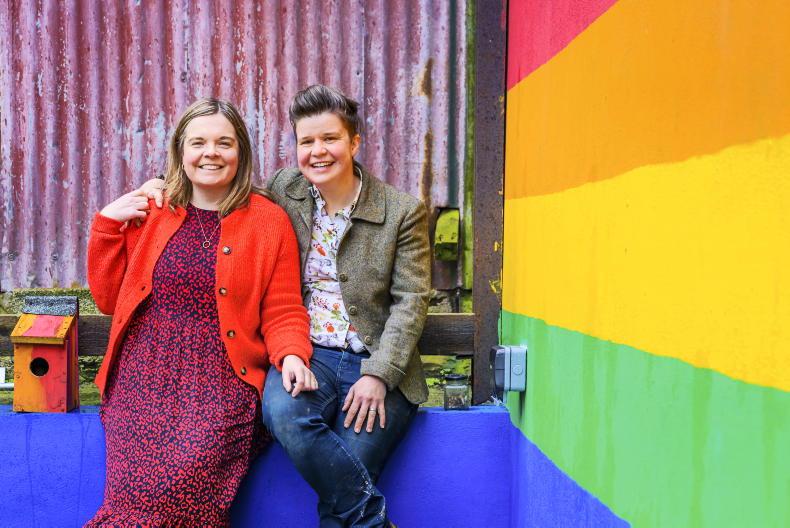
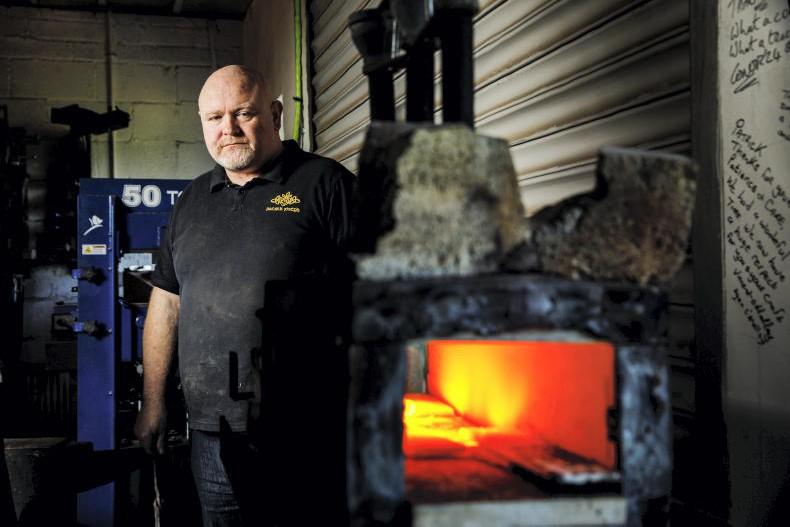

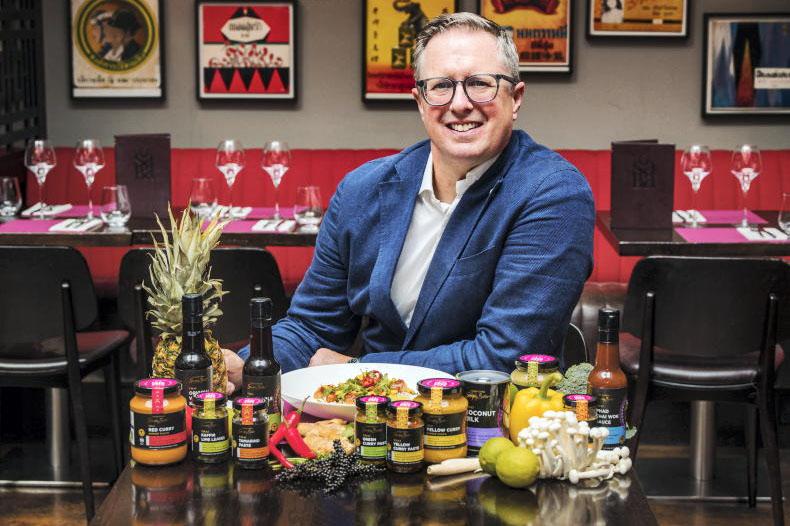
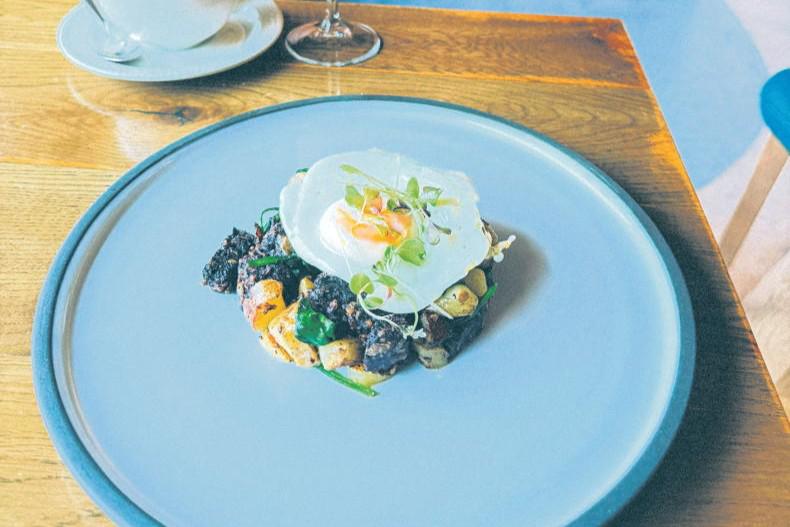
SHARING OPTIONS